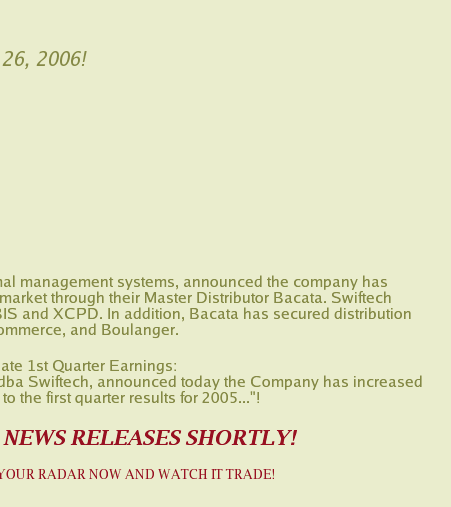|
Hedoes not want a display of learning; he wants news about something
whichconcerns himself, and you must tell it to him in a plain, simple
mannerjust as you would do if you were face to face with him. When wesee a
wealthy man staggering along a fashionable thoroughfare under theinfluence of
alcohol, waving his arms in the air and shouting boisterously,we smile and say,
poor gentleman, he is somewhat _exhilarated_; or at worstwe say, he is slightly
_inebriated_; but when we see a poor man who hasfallen from grace by putting an
"enemy into his mouth to steal away hisbrain" we express our indignation in the
simple language of the words:"Look at the wretch; he is dead drunk.
In fact,
in some cases, slang hasbecome so useful that it has far outstripped classic
speech and made foritself such a position in the vernacular that it would be
very hard insome cases to get along without it. net/pgThese Web sites include
award-winning information about ProjectGutenberg, including how to donate, how
to help produce our neweBooks, and how to subscribe to our email newsletter
(free!). We are now trying to release all our eBooks one year in advanceof the
official release dates, leaving time for better editing. "(8) Do not use
newspaper words which have not established a place in thelanguage as "to
bugle"; "to suicide," etc.
" "What are you givingme," supposed to be a thorough
Americanism, is based upon Genesis,xxxviii:16. Never hunt forsubjects, there
are thousands around you.
You must know the nature of the weekly to which
yousubmit your copy the same as you must know the daily. STRENGTH_Strength_ is
that property of style which gives animation, energy andvivacity to language
and sustains the interest of the reader. Information about Project Gutenberg
(one page)We produce about two million dollars for each hour we work.
Such
words are understood by them and understood by the learned as well;why then not
use them universally and all the time? Why make a one-sidedaffair of language
by using words which only one class of the people, theso-called learned class,
can understand? Would it not be better to use,on all occasions, language which
the both classes can understand? If wetake the trouble to investigate we shall
find that the men who exertedthe greatest sway over the masses and the
multitude as orators, lawyers,preachers and in other public capacities, were
men who used very simplelanguage. Some slang, however, can trace its origin
back to veryrespectable sources. Be constantly on the lookout for something
that will suit the passinghour, read the daily papers and probably in some
obscure corner you mayfind something that will serve you as a foundation for a
good article--something, at least, that will give you a clue.
As a general
rule ornamental things serve but littlepurpose.
Perseverance counts more in the
newspaper field than anywhere else, andonly perseverance wins in the long run.
Many of our most pleasing euphonic words, especially in the realm ofmusic, have
been given to us directly from the Italian.
The grandest allegory in the
English, infact, in any language, was written by an ignorant, so-called
ignorant,tinker named John Bunyan. Words of "learned length and thundering
sound" should beavoided on all possible occasions. The secret of literaryskill
from any standpoint consists in putting the right word in the
rightplace.
Please note neither this listing nor its contents are final
tilmidnight of the last day of the month of any such announcement.
It is
theopinion of many that English, in a short time, will become the
universallanguage.
In fact there areas many styles as there are writers, for
no two authors write _exactly_after the same form. CHAPTER XIMASTERS AND
MASTERPIECES OF LITERATUREGreat Authors--Classification--The World's Best
Books.
Remember that most all slang is of vulgarorigin and bears upon its face
the bend sinister of vulgarity.
The former were introduced by the
RomanChristians, who came to England at the close of the sixth century
underAugustine, and relate chiefly to ecclesiastical affairs, such as saint
from_sanctus_, religion from _religio_, chalice from _calix_, mass from_missa_,
etc.
THIS MUCH--THUS MUCH"_This_ much is certain" should be "_Thus_ much or
_so_ much is certain.
Don't attempt to describe a scene in Australia if you
havenever been there and know nothing of the country.
In his own peculiar,
abrupt, crusty waythe Sage of Chelsea interrogated the young man: "For what
profession areyou studying?" "I don't know," returned the youth. Don't attempt
to describe a scene in Australia if you havenever been there and know nothing
of the country. " You're not a Milton and besides over a millionhave stolen it
from Milton until it is now no longer worth stealing. True, you should read
the best authorsand, as far as possible, imitate their style, but don't try to
literallycopy them. On the wide, tented field in the battle of life, With
an army of millions before you; Like a hero of old gird your soul for the
strife And let not the foeman tramp o'er you; Act, act like a soldier and
proudly rush on The most valiant in Bravery's van, With keen, flashing
sword cut your way to the front And show to the world you're a _Man_.
The
world is anopen book in which all who run may read.
Book learning is most
desirable, but, after all, it isonly theory and not practice. If we address an
audience of ordinary men and women in the Englishlanguage, but use such words
as they cannot comprehend, we might as wellspeak to them in Coptic or Chinese,
for they will derive no benefit fromour address, inasmuch as the ideas we wish
to convey are expressed inwords which communicate no intelligent meaning to
their minds. "(8) Do not use newspaper words which have not established a place
in thelanguage as "to bugle"; "to suicide," etc. The great purists, the
masters of diction, theexemplars of style, used short, simple words that all
could understand;words about which there could be no ambiguity as to meaning.
Thereforethose who are trying to do away with some of the purely
Anglo-Saxonwords, on the ground that they are not refined enough to express
theiraesthetic ideas, are undermining main props which are necessary for
thesupport of some important parts in the edifice of the language.
Shakespeare, at his best, isAnglo-Saxon.
|







